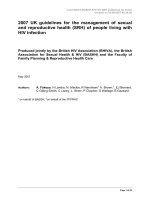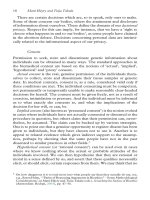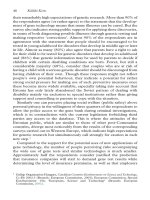Family related partiality communitarianism, care ethics and early confucianism
Bạn đang xem bản rút gọn của tài liệu. Xem và tải ngay bản đầy đủ của tài liệu tại đây (593.32 KB, 214 trang )
FAMILY-RELATED PARTIALITY:
COMMUNITARIANISM, CARE ETHICS, AND EARLY
CONFUCIANISM
LI WANQUAN
(MASTER OF PHILOSOPHY), NUS
A THESIS SUBMITTED FOR THE DEGREE OF
DOCTOR OF PHILOSOPHY
DEPARTMENT OF PHILOSOPHY
NATIONAL UNIVERSITY OF SINGAPORE
2010
i
Acknowledgement
First and foremost, I would like to express my sincere gratitude to my
supervisor, Professor Tan Sor-hoon, whose patience and continuous
encouragements support me to go through every stage in this long and
never-ending journey. I want to thank other staff in the department, especially
members of the thesis committee, Professor C. L. Ten and Dr. Loy Hui Chieh, as
well as Professor Li Chenyang and Professor Daniel A. Bell, for their helpful
comments. I also want to thank National University of Singapore for providing the
scholarship which made this thesis possible. Last but not least, I want to express
my gratitude to my family and my friends who provide the initial inspiration for
this thesis.
ii
Table of Contents
1 Introduction 1
1.1 The Nature of the Enquiry 1
1.2 Family-related Partiality 7
1.3 Communitarianism, Care Ethics, and Early Confucianism 21
1.4 Self, Identity-Holding, and General Version of Family-related Partiality 27
2 Communitarianism and Family-related Partiality 39
2.1 Communitarian Self and the General Version of Family-related Partiality 42
2.2 Walzer’s DSE as a Version of Communitarian Partiality 53
2.3 The Concept of Community 65
3 Care Ethics and Family-related Partiality 86
3.1 Relational Self and the General Version of Family-related Partiality 88
3.2 Caring and The Particular Version of Family-related Partiality 107
3.3 Caring, Empathy, and Sympathy 119
4 Early Confucianism and Family-related Partiality 130
4.1 Confucian Self and the General Version of Family-related Partiality 138
4.2 Filial Piety and the Particular Family-related Partiality 150
4.3 Filial Piety, Ren, and Wider Concerns 167
5 Conclusion 178
Bibliography 185
iii
Abstract
This thesis attempts to investigate the issue of family-related partiality within
the frameworks of three theories, communitarianism, care ethics, and early
Confucianism. The issue of impartiality and partiality has been extensively
debated in moral and political thinking. On the one hand, impartiality is generally
recognized as crucial for moral and political theories. On the other hand, partial
treatment for some people is also widely deemed acceptable, if not sometimes
morally required. Such views are especially persuasive regarding people who are
connected with us in special ways, our fellow countrymen, our neighbors, our
friends, our family members. Among the subjects of partial treatment, family
members are undoubtedly recognized as the main focus of partiality and the most
compelling cases in support of partiality usually involve family members. This
thesis will investigate how communitarianism, care ethic, and early Confucianism
can address the issue of family-related partiality as well as the similarities and
differences among different approaches, which may also help us better understand
these three theories.
The discussion of communitarianism in this thesis is limited to the so-called
“modern-day communitarianism” mainly started by Charles Taylor, Michael
Walzer, Michael Sandel, and Alasdair MacIntyre. Care ethics refers to the moral
and political theorizing widely recognized as starting with Carol Gilligan and Nel
Noddings. Early Confucianism refers to three major texts, The Analects of
iv
Confucius, Mengzi, and Xunzi.
The examination of family-related partiality in each theory will be further
distinguished into two kinds, the general version and the particular version of
family-related partiality. While the general versions may reveal the similarities
among these three theories in general, especially in relation to the issue of
partiality, the particular versions appeal to particular characteristics for each
theory.
For the general version of family-related partiality, it is related to the
conception of self in each theory, the examination of which will not only show the
similarities regarding the conception of self in each theory but also indicate the
differences in terms of the extent of partiality toward family members.
Unlike the similar construction of general version of family-related partiality
for all three theories, the particular version of family-related partiality varies from
one to another, which may better represent the unique characteristics for each
theory. For communitarianism, the particular version appeals to the concept of
community for communitarianism. For care ethics, the particular version of
family-related partiality is related to the idea of caring. For early Confucianism,
the particular version of family-related partiality is connected with the idea of
filial piety.
In the end, when we consider together the general and the particular version
of family-related partiality, we may conclude that communitarianism provides
relatively weaker support for partial concerns for family members while care
v
ethics and early Confucianism both provide stronger support, despite different
interpretations of caring and the consideration of other essential ideas in early
Confucianism. This is obviously only a preliminary result for an endeavor that can
be developed in both directions. It can be further developed into a thorough
investigation of partiality and impartiality or comprehensive comparative studies
of communitarianism, care ethics, and early Confucianism. This thesis, however,
ends here as it aims to further our understanding of communitarianism, care ethics,
and early Confucianism in relation to the issue of family-related partiality and
partiality in general, which will prepare us to move on to either direction as it is
mentioned above.
1
Chapter One
Introduction
The Nature of the Enquiry
This thesis attempts to investigate the issue of family-related partiality
within the frameworks of three theories, communitarianism, care ethics, and early
Confucianism. The issue of impartiality and partiality in general has been
extensively debated in moral and political thinking.
1
This may not be surprising
or by itself endow the issue with extraordinary status, since almost everything in
moral and political theory has been widely discussed, but it does suggest that the
investigation of this issue is of some significance. There are arguments supporting
both impartiality and partiality. On the one hand, impartiality is generally
recognized as crucial for moral and political theories. Impartiality is sometimes
1
See, for example, John Kekes, “Morality and Impartiality,” American
Philosophical Quarterly, Vol. 18, No. 4, 1981, pp. 295-303; John Cottingham,
“Ethics and Impartiality,” Philosophical Studies, Vol. 43, 1983, pp. 83-99; Thomas
Nagel, Equality and Partiality, Oxford: Oxford University Press, 1991; Marilyn
Friedman, “The Practice of Partiality,” Ethics, Vol. 101, No. 4, 1991, pp. 818-835;
Brian Barry, Justice as Impartiality, Oxford: Clarendon Press, 1995; John
Cottingham, “The Ethical Credentials of Partiality,” Proceedings of the
Aristotelian Society, Vol. 98, 1998, pp. 1-21; David Brink, “Impartiality and
Associative Duties,” Utilitas, Vol. 13, No. 2, 2001, pp. 152-172; Susan Mendus,
Impartiality in Moral and Political Philosophy, Oxford: Oxford University Press,
2002; Amitai Etzioni, “Are Particularistic Obligations Justified? A Communitarian
Examination,” Review of Politics, Vol. 64, No. 4, 2002, pp. 573-598; Amartya Sen,
“Open and Closed Impartiality,” Journal of Philosophy, Vol. 99, No. 9, 2002, pp.
445-469; Joseph Raz, Value, Respect, and Attachment, Cambridge: Cambridge
University Press, 2004; David Miller, “Reasonable Partiality Towards
Compatriots,” Ethical Theory and Moral Practice, Vol. 8, 2005, pp. 63–81.
2
assumed to be the defining character to differentiate moral discourse from
non-moral ones, or at least a necessary part of moral requirement.
2
Public policies
are generally expected to manifest an impartial attitude toward everybody, or at
least citizens within the national border. The enforcement of law is closely
connected with impartiality to the extent that legal justice is viewed as impartial
and judges are required to be impartial to both sides.
3
On the other hand, partial
treatment for some people is also widely deemed acceptable, if not sometimes
morally required. Such views are especially persuasive regarding people who are
connected with us in special ways, our fellow countrymen, our neighbors, our
friends, our family members. Among the subjects of partial treatment, family
members are undoubtedly recognized as the main focus of partiality and the most
compelling cases in support of partiality usually involve family members.
4
One
way of examining the issue of partiality in general and family-related partiality in
2
John Kekes, “Morality and Impartiality,” p. 295; Richard Double, “Morality,
Impartiality, and What We Can Ask of Persons,” American Philosophical
Quarterly, Vol. 36, No. 2, 1999, p. 149; Robert E. Goodin, Utilitarianism as a
Public Philosophy, Cambridge: Cambridge University Press, 1995, p. 266; Roger
Trigg, Morality Matters, Oxford: Blackwell, 2005, p. 138.
3
Leslie Paul Thiele, Thinking Politics: Perspectives in Ancient, Modern, and
Postmodern Political Theory, New York: Seven Bridges Press, 2002, pp. 211-212;
William C. Heffernan, "Social Justice/Criminal Justice," in From Social Justice to
Criminal Justice: Poverty and the Administration of Criminal Law, edited by
William C. Heffernan and John Kleinig, Oxford: Oxford University Press, 2000, p.
74; Barbara Hudson, "Punishing the Poor: Dilemmas of Justice and Difference,"
in From Social Justice to Criminal Justice: Poverty and the Administration of
Criminal Law, p. 201; Richard Dagger, Civic Virtues: Rights, Citizenship, and
Republican Liberalism, Oxford: Oxford University Press, 1997, p. 182; John
Rawls, A Theory of Justice, Cambridge: The Belknap Press, 1999, p. 210.
4
See, for example, Robert E. Goodin, Utilitarianism as a Public Philosophy, pp.
267-268.
3
particular would be to address the issue in the framework of one particular theory.
For example, as the dominant moral and political theory today, liberalism is
committed to the ideal of impartiality. For liberalism, the pursuit of impartiality is
connected with the recognition of the rights of others and the neutrality of the state
with equal autonomous individuals who pursue different plans.
5
The issue of
impartiality and partiality in relation to family is addressed by drawing a
dichotomy of the public and the private after advocating impartiality, and then,
trying to accommodate certain tendencies toward partiality.
6
Although this
strategy may prove to be convenient, it faces strong critiques in relation to this
(alleged) dichotomy of the public and the private. For example, the dichotomy of
the public and the private is argued to be connected with and reinforce the
inequalities between men and women in the society.
7
Instead of engaging in
5
Bert van den Brink, The Tragedy of Liberalism: An Alternative Defense of a
Political Tradition, New York: State University of New York Press, 2000, p. 173;
John Rawls, A Theory of Justice, 1999, p. 52; Thomas Nagel, “Moral Conflict and
Political Legitimacy,” Philosophy and Public Affairs, Vol. 16, No. 3, 1987, pp.
215-216; Chandran Kukathas, “Liberalism, Communitarianism, and Political
Community,” Social Philosophy and Policy, Vol. 13, 1996, p. 80; Tim Mulgan,
“The Place of the Dead in Liberal Political Philosophy,” Journal of Political
Philosophy, Vol. 7, No. 1, 1999, p. 53.
6
Even so, there is still the tension between impartiality within the national border
and that beyond it, which is represented in the debates of liberal nationalism and
liberal cosmopolitanism. See, for example, Kok-Chor Tan, Justice without Borders:
Cosmopolitanism, Nationalism, and Patriotism, Cambridge: Cambridge
University Press, 2004.
7
Susan Moller Okin, “Gender, the Public, and the Private,” in Feminism and
Politics, edited by Anne Phillips, Oxford: Oxford University Press, 1998, pp.
116-141; Iris Marion Young, “Impartiality and the Civic Public: Some
Implications of Feminist Critiques of Moral and Political Theory,” in Feminism as
Critique: On the Politics of Gender, edited by Seyla Benhabib and Drucilla
Cornell, Minneapolis: University of Minnesota Press, 1987, pp. 63-67.
4
debates on how liberalism can address the issue of partiality, we may also find it
inspiring to investigate how such issue can be handled by other theories. For
example, among the opponents of liberalism, communitarianism, care ethics, and
early Confucianism can provide different strategies to address the issue of
partiality in relation to the family. It is the aim of this thesis to investigate how
communitarianism, care ethic, and early Confucianism can address the issue of
family-related partiality as well as the similarities and differences among different
approaches, which may also help us better understand these three theories.
In order to clarify the focus of this thesis and avoid confusion, two points
must be made clear at the beginning of this thesis. First, it is not the assumption of
this thesis that these three theories can better handle the issue of family-related
partiality than other theories, or vice versa. Attempts will not be made to compare
these three theories with other moral and political theories, which is necessary to
either support or refute either of the above view. Such comparative studies, with
communitarianism, care ethics, and early Confucianism on one side, and
liberalism, utilitarianism, for example, on the other, are beyond the scope of this
thesis. The thesis will limit itself to examining these three theories.
Communitarianism, care ethics, and early Confucianism all provide answers
to the issue of family-related partiality within the framework of each theory and
they are put together here as it will be demonstrated that they all hold seemingly
positive views toward family-related partiality. It does not follow that they all
render unconditional support for family-related partiality as each of them imposes
5
restrictions on the scope of family-related partiality in its own way. The one
difference between them and other moral and political theories, liberalism and
utilitarianism for example, is that they begin with the inclination toward partiality
in general and family-related partiality in particular and move on to accommodate
wider moral concerns while other theories may start with the inclination toward
impartiality in general and move on to accommodate our partial concerns.
Second, the comprehensive comparative studies of these three theories are
also beyond the scope of this thesis. Even for a limited comparative investigation
of these three theories, there are many other perspectives from which we can
conduct such comparative studies and the adoption of family-related partiality as
the focus here does not imply that this topic is necessarily better than other topics
for achieving more in-depth understanding of these three theories. This thesis
merely claims that the issue of family-related partiality would provide a unique
and interesting angle from which these three theories can be studied.
Although both communitarianism and care ethics are modern products from
the west while early Confucianism originated more than two thousand years ago
in China, it will be established in the end that the distance between the modern
and the ancient, between the west and China, is not beyond mutual comprehension,
and mutual appreciation and accommodation is a real possibility.
8
In the
following sections of this chapter, the concept of family-related partiality will be
8
Obviously, it is not the assumption of this thesis that modern western moral and
political theories are only represented by communitarianism and care ethics, or
ancient Chinese thoughts are represented only by early Confucianism.
6
introduced and reasons will be presented why this term is chosen. Since in fact
two general and particular versions of family-related partiality will be examined
in communitarianism, care ethics, and early Confucianism, clarification is needed
to explain the differences between the general version and the particular version of
family-related partiality. For the exploration of family-related partiality in three
theories, it will be divided into two parts in each theory, with the former focusing
on the general version of family-related partiality and the latter, the particular
version of family-related partiality. The general version of family-related partiality
in each theory is based on the conception of self which would provide the
possibility for comparative studies concerning the similarities and differences of
the conceptions of self in three theories. It is called the general version because
the conception of self in relation to this kind of family-related partiality can be
identified not only in all three theories, but also in other theories, and it provides a
general starting point for justifying partiality. In contrast, the particular version of
family-related partiality is based on an ideal both essential and unique in each
theory, that is, the concept of community in communitarianism, the concept of
caring in care ethics, and the concept of filial piety in early Confucianism; not all
moral or political theories have ideals which support family-related partiality in
such particular ways.
Second, the three theoretical frameworks will be briefly presented in which
the issue of family-related partiality will be addressed, that is, communitarianism,
care ethics, and early Confucianism.
7
Third, attempts will be made to introduce a common structure for examining
how these three theories deal with the issue of family-related partiality through the
conceptions of self and its relation to the general version of family-related
partiality. Unlike the particular version of family-related partiality in each theory
which concentrates on different ideals, the general versions of family-related
partiality in all three theories bear close resemblance as they are based on the
conceptions of self that are similar in all three theories.
Family-related Partiality
Generally speaking, impartiality is understood as referring to the equal
treatment of everybody, which closely connected with the idea that everybody
should be given equal moral weight. This is obviously not the only definition of
impartiality. According to Marilyn Friedman, impartiality can be defined as
referring to “an absence of bias or prejudice.”
9
Although equal treatment of
everybody may actually suggest the “absence of bias or prejudice,” the worry here
is that the definition of impartiality as “an absence of bias or prejudice” may
suggest, either implicitly or explicitly, the embedment of positive moral evaluation
in this concept, which may hinder the investigation of family-related partiality. It
should also be pointed out that the above definition of impartiality at the
beginning which incorporates both equal treatment and equal moral weight may
9
Marilyn Friedman, "The Impracticality of Impartiality," Journal of Philosophy,
Vol. 86, No. 11, 1989, p. 646.
8
not be accurate since equal moral weight for everybody does not always go
together with equal treatment of everybody as other things are almost never
equal.
10
In contrast, partiality refers to the departure from impartiality, during which
some people are awarded special treatment for reasons often thought to be morally
unjustifiable or even reprehensible.
11
However, not all departures from impartiality can be called partiality.
Sometimes people may put the well-being of others above their own and it is
clearly not what we usually include in the category of partiality, at least not the
kind of partiality which will be discussed in this thesis, although it departs from
impartiality. For example, during the Second World War, some people put the
well-being of others above themselves by risking their lives to save Jews under
Nazi’s rule.
12
10
For the purpose here, however, we can simply put aside the possible gap
between these two understandings of impartiality without damaging the attempt to
appreciate the differences between impartiality and partiality.
11
It is only for the purpose of clarification here that I present such dichotomy
between impartiality and partiality. It will become clear in the following chapters
that such dichotomy is an overstatement, if not wholly misconceived.
12
See Kristen R. Monroe and Michael C. Barton, Ute Klingemann, "Altruism and
the Theory of Rational Action: Rescuers of Jews in Nazi Europe," Ethics, Vol. 101,
No. 1, 1990, pp. 103-122. Objection may be raised that for such cases, people did
not really put the well-being of others above themselves since they were risking,
not sacrificing, their lives for the lives of others’. It should be pointed out that
such description of departure from impartiality is for the purpose of theoretical
clarification and whether such cases do exist may not prove to be crucial.
However, I would like to provide some other relevant and more vivid cases, which
may more readily accommodate my description of such departure from
impartiality. See Kristen Renwick Monroe, The Heart of Altruism: Perceptions of
a Common Humanity, Princeton: Princeton University Press, 1996, pp. ix-x.
9
In contrast with impartiality, which indicates that everybody should be treated
equally, partiality suggests that from the agent’s point of view, other things being
equal, she should be given more moral weight or some people, because they are
special to her in some way, should be given more weight compared with others.
The former kind of partiality is usually called egoism. It is the latter kind of
partiality which will be investigated in this thesis.
13
It also should be pointed out that departures from impartiality can go both
ways. The departure in the other direction, that is, from the agent’s point of view,
other things being equal, other people should be given more moral weight
compared with the agent herself, such as the case of rescuing Jews during Nazi’s
rule, is what is usually meant by altruism. The theme of this thesis, that is,
family-related partiality, should be characterized as a specific departure from
impartiality, which gives more weight to some people because they are one’s
family members compared with the way one treats others who are not thus related
to oneself.
It is widely observed that people give special treatment to their family
members, their friends, people from the same town, their compatriots, people who
speak the same language, people who believe in the same God, and fellow human
beings (as compared with animals). But there is a big difference between the
reality and the normative. The existence of partial practice does not automatically
13
Egoism may go even further to claim that other people should be given no
moral weight. Richard Kraut, What Is Good and Why: the Ethics of Well-being,
Cambridge: Harvard University Press, 2009, pp. 39, 54.
10
suggest its universal acceptance or justification, but it does require explanation, if
not justification, of this phenomenon.
Since impartiality is generally cherished in Western liberal moral and political
theories, partiality is sometimes given a bad name. For example, A. W.
Musschenga claims that “[u]ndoubtedly, impartiality has always been looked upon
as one of the defining characteristics of right actions and morally good persons
Becoming a moral person implied: learning to resist and control one’s always
present self-regarding tendencies.”
14
Idil Boran also asserts that “[i]t is commonly
held that morality requires an agent to be always impartial in assessing the
morally right course of action in a given situation.”
15
But questions are raised by
our everyday experience that may contradict the above high praise for impartiality
and the rejection of partiality. This may explain why theoretical adjustment has
been made to accommodate our everyday experience of partial practice. Moral
and political theorists have accepted the unavoidability of partial practice for some
time. As Friedman admits, “[h]ardly any moral philosopher, these days, would
deny that we are each entitled to favor our loved ones. Some would say, even
more strongly, that we ought to favor them, that it is not simply a moral option.
This notion of partiality toward loved ones is lately gaining wide philosophical
acclaim.”
16
14
A. W. Musschenga, "The Debate on Impartiality: An Introduction," Ethical
Theory and Moral Practice, Vol. 8, 2005, p. 1.
15
Idil Boran, "On Distinguishing Between Types of Impartiality," Journal of
Value Inquiry, Vol. 38, 2004, p. 333.
16
Marilyn Friedman, "The Practice of Partiality," p. 818.
11
As pointed out above, there are many kinds of partial practice according to
different recipients of partial treatment. In this thesis, efforts will be made to
investigate the partial treatment toward family members, that is, the partiality of
children to their parents, and of parents to their children, the partiality between
spouses, and those between siblings. Obviously, the relationships between parents
and children, between spouses, and between siblings, are not an exhaustive list of
all possible family relationships. In different cultures and during different periods,
family may have different scopes and include different relationships besides the
most basic ones which may be commonly observed. Family members may include
grandparents, grandchildren, uncles, aunts, cousins, etc. and for each concrete case,
a family may include other kinds of relationships or lack certain of the
above-mentioned relationships.
What is family? Various definitions of family have been constructed in an
attempt to accommodate various kinds of social institutions that we may refer to
as families. The problem has become more complicated since families have
changed dramatically ever since industrialization, and even more so in the past
several decades.
17
We have seen more and more single-parent families, blended
families with at least one spouse who already has a child or more from a previous
relationship, homosexual families, families with absent parents and grandparents
17
Mark Hutter, "History of Family," in The Blackwell Encyclopedia of Sociology,
edited by George Ritzer, Oxford: Blackwell, 2007, p. 1594; Gary Stanley Becker,
A Treatise on the Family, Harvard: Harvard University Press, 1991, pp. 1-2;
Pamela McMullin-Messier, "Family," in Encyclopedia of Social Problems, edited
by Vincent N. Parrillo, London: Sage Publications, 2008, pp. 352-354.
12
raising the grandchildren, etc. It takes another thesis, perhaps several, to articulate
a concept which can accommodate all the changing social realities. What matters
here, however, is that a simple definition of family which consists of a couple and
children would suffice for the purpose of the discussion of family-related partiality
in this thesis. Obviously, there are variations of family which may not fall in the
mainstream of this concept, such as adopted family, homosexual family, etc.
Whether the final conclusions in this thesis can apply for all kinds of families, or
social groups which we usually refer to as families, have important moral and
political implications, but it is also beyond the scope of this thesis and will be left
for further investigations.
The immediate question in response to the focus on family-related partiality
would be: what are the differences between family members and other people
whom we also usually give partial treatment, such as people from the same town
and compatriots?
18
One obvious answer would be blood ties. A big problem with this answer in
relation to family is that it would exclude spouses, and adopted family members,
all of whom are not considered marginal in thinking about family. However, it is
indeed argued that it is the blood ties that unite people together in the family for
18
And people of the same race perhaps. Although I do not want to make some
“politically incorrect” remarks, I still would like to point out that, from the agent’s
position, what is really troubling about racism is not the different treatment of
people, but the assumption of the inferiority of and hatred toward certain people.
See, for example, Lawrence Blum, “Racism: What It Is and What It Isn’t”, in
Education, Democracy, and the Moral Life, edited by Michael S. Katz, Susan
Verducci, and Gert Biesta, Dordrecht: Springer, 2009, p. 77.
13
Confucianism, which even leads to the resistance to, if not rejection of, the
practice of adoption.
19
By blood ties, if we refer to the importance of the continuity of certain
qualities-carrying genes in relation to their physical manifestation, we as children
may be compelled to exclude family members such as parents while
contemplating on blood ties. Parents did contribute but would not continue to
contribute to the project. In contrast, it follows that we should pay more attention
to our children, our siblings (and ourselves) who will contribute to the
continuation of these genetic qualities.
20
Moreover, if what matter are those genes
in relation to certain genetic qualities, it may not be a wild guess that genes which
carry similar, if not same, qualities can be identified in someone else who is not a
family member. If we refer to certain combinations of genes as well as the
similarities among them, we can include parents but how exactly can we argue for
the similarities between combinations of genes? One possible answer might be
that for parent and child, the child can be considered as part “of a continuous
biological process” which “began as an episode in the biological life of the
19
Ren-Zong Qiu, “Sociocultural dimensions of infertility and assisted
reproduction in the Far East,” in Current Practices and Controversies in Assisted
Reproduction: Report of a meeting on "Medical, Ethical and Social Aspects of
Assisted Reproduction”, held at WHO Headquarters in Geneva, Switzerland,
17–21, September 2001, edited by Effy Vayena, Patrick J. Rowe, and P. David
Griffin, Geneva: World Health Organization, 2002, p. 78.
/>pe=pdf, accessed on 1th, August, 2010.
20
Michael W. Austin, “The Failure of Biological Accounts of Parenthood,”
Journal of Value Inquiry, Vol. 38, 2004, p. 499.
14
parent.”
21
The argument is, however, different from those that concentrate on the
fact that genetic parents brought into this world their children who in turn are
entitled with some special claims.
22
It rests on the discontinuity of self in different
times and draws on the stance that one has reason to be partial to oneself in
different times and that genetic similarities between a self in different times (hence
multiple selves) and those between one and one’s genetic child are similar. It
therefore follows that one has “reason to respond to [one’s] relationship to [one’s]
genetic child in a way that is similar to the way in which [one has] reason to
respond to [one’s] relationship to [oneself] at other times.”
23
For this thesis,
however, it would suffice to claim that we only consider the circumstances where
blood ties coincide with closeness, either in the past or in the present, for family
members.
Another possible answer toward why family members are different might be
that we are more closely related to our family members both physically and
emotionally. But what about our close friends as well as our colleagues? We may
spend more time with people with whom we study and work, and establish more
intimate relationships with our close friends than with some of our family
members. In modern industrialized societies, many people go to various places to
21
Niko Kolodny, “Which Relationships Justify Partiality? The Case of Parents
and Children,” Philosophy and Public Affairs, Vol. 38, No. 1, 2010, p. 70. It
should be noted, however, that such explanation cannot accommodate siblings.
22
Tibor R. Machan, “Between Parents and Children,” Journal of Social
Philosophy, Vol. 23, No. 3, 1992, pp. 20-21.
23
Niko Kolodny, “Which Relationships Justify Partiality? The Case of Parents
and Children,” p. 71.
15
search for employment opportunities and make a living away from their family,
which locates people physically farther away from their family members, such as
parents, siblings. Besides, even the most optimistic observers cannot deny the
existence of dysfunctional families, where family members are abused either
mentally or physically or both. The assumption of closer physical and emotional
relatedness does not hold for such dysfunctional families.
But the fact that we call these families dysfunctional suggests that we usually
have a general ideal of a family implying physical and emotional closeness. This
ideal may not be realized in each and every family we encounter. But let us briefly
consider other categories of people whom we give special treatment, people who
speak the same language, those who believe in the same God, and those who are
our compatriots. We would not be surprised to find people in these categories
whom we do not like or even resent. Just as these examples would not render the
whole investigation on the partiality toward compatriots unnecessary, the special
cases of dysfunctional family or other families where members are not partial to
one another would not make the issue of family-related partiality misconceived.
Perhaps the previous answer for the difference between family members and other
groups of people we give special treatment needs a minor revision to avoid
possible attacks from empirical evidence: we are simply generally more closely
related to our family members both physically and emotionally.
What is more important for this thesis concerning the term “family” is why
the term “family-related partiality” is adopted. For example, why not use the term
16
“family-based partiality” in this thesis? There are three reasons why the term
“family-related partiality”, rather than family-based partiality for example, is
chosen in this thesis. The term “family-related partiality” emphasizes family
relations and refers to the partial treatment toward family members, that is, the
partiality of children to their parents, and of parents to their children, the partiality
between spouses, and between siblings, in which partiality arises because of the
particular family relationships. In contrast, “family-based partiality” may give the
misleading impression that the family as an institution serves as the basis of
partiality.
The first reason is related to translation in connection with early
Confucianism. Unlike the term “family-related partiality”, “family-based
partiality” and its possible overemphasis on family as an institution will highlight
the difficulties of locating the exact translation of the term “family” in early
Confucianism. In modern mandarin, “jia 家” translates “family”. The formation
of Chinese character jia 家 is composed of two parts, one referring to the
Chinese character for “pig” and the other the character for “house.”
24
It is clear
that jia originally refers to the place where pigs are kept and subsequently where
one lives.
25
If early Confucian texts are examined, convincing evidence can be
found that during the time of these early Confucian texts, jia sometimes refers to
the social group including parents, children, husband and wife. In some cases, jia
24
Yi Liyun, Han Zi Zi Yuan Xi Tong Yan Jiu, Beijing: Renmin University of
China Press, 1998, p. 258.
25
Xu Shen, Shuo Wen Jie Zi, Changsha: Yue Lu Shu She, 2006, p. 150; Tang
Kejing, ed., Shuo Wen Jie Zi Jin Shi, Changsha: Yue Lu Shu She, 1997, p. 988.
17
also includes the larger social group of relatives and even those not related by
blood or marriage, and it may not be easy to separate these two kinds of meanings
of jia at the time. The term jia also has other meanings in the texts of early
Confucianism.
The potential problem in connection with the equation of family with jia is
that, despite occasions when jia in early Confucianism is usually translated as
family, the English term “family” suggests an entity distinctively separated from
other entities, especially the state. In early Confucianism, however, such
separation of family and state cannot be accepted without scrutiny. For the three
main early Confucian texts, The Analects of Confucius, Mengzi, and Xunzi, the
exact character jia appears 11 times in Analects, among which 4 times it refers to
the nobles (da fu) and/or their feudal estate and 7 times it refers to the family in
general, or household.
26
In Mengzi, jia appears 31 times, among which 17 times it
refers to the nobles (da fu) and/or their feudal estate and 14 times it refers to the
family in general, or household.
27
In Xunzi, jia appears around 55 times, among
which 23 times it refers to the nobles (da fu) and/or their feudal estate,
28
10 times
26
For the former, see Analects, 3.2, 5.8, 16.1, and for the latter, see Analects, 12.2,
12.20, 17.16, 19.23, 19.25, 12.20. Roger T. Ames and Henry Rosemont, Jr., The
Analects of Confucius: a Philosophical Translation, New York: Ballantine Books,
1998.
27
For the former, see Mengzi, 1A.1, 1B.9, 2A.1, 2A.4, 3A.4, 3B.3, 3B.10, 5B.3,
6B.15, 7A.11, and for the latter, see Mengzi, 1A.3, 1A.7, 3A.3, 3B.2, 3B.3, 3B.7,
4A.5, 4A.8, 6B.1, 7A.22. James Legge, The Works of Mencius, Oxford: Clarendon
Press, 1895.
28
See, Xunzi, 2.2, 4.7, 6.4, 8.8, 9.2, 9.17, 9.19, 10.11, 11.1a, 13.2, 14.2, 15.5, 17.9,
25.18, 27.17, 27.27, 27.41, 27.61, 29.3. John Knoblock, Xunzi: A Translation and
Study of the Complete Works, Stanford: Stanford University Press, 1994.
18
it refers to the theories of certain schools of thought,
29
1 time it refers to a
person’s name,
30
and 21 times it refers to the family in general or household.
31
It
is difficult to determine in many cases whether jia refers to the nobles (da fu)
and/or their feudal estate or the family in general especially when jia is
accompanied with guo (state) as in guo jia. In Xunzi, guo jia has been consistently
translated as nation or state. For example,
故人無禮則不生,事無禮則不成,國(guo)家(jia)無禮則不寧。(Xunzi,
2.2)
Thus, a man without ritual will not live; an undertaking lacking ritual
will not be completed; and a nation without ritual will not be tranquil.
(Xunzi, 2.2)
32
Hence, [i]n lives without ritual people cannot survive; In affairs
without ritual success does not thrive; To states without ritual peace
does not arrive. (Xunzi, 2.2)
33
In Mengzi, guo jia is usually translated as state and occasionally as state and
family. For example,
從許子之道,相率而為偽者也,惡能治國(guo)家(jia)?(Mengzi,
3A.4)
For people to follow the doctrines of Hsü, would be for them to lead
one another on to practise deceit. How can they avail for the
government of a State? (Mengzi, 3A.4)
34
29
See, Xunzi, 8.13, 21.1, 21.4, 22.3f, 22.6a, 25.14, 27.105.
30
See, Xunzi, 27.58.
31
See, Xunzi, 4.3, 5.2, 8.2, 9.12, 9.13, 9.17, 12.6, 14.7, 15.1d, 15.1f, 16.6, 19.4c,
21.8, 26.4, 27.35, 27.52, 27.57, 27.91, 27.97, 27.100, 28.3.
32
All translation of Xunzi, unless otherwise specified, is from John Knoblock,
Xunzi: A Translation and Study of the Complete Works.
33
Eric L. Hutton, “Xunzi,” in Readings in classical Chinese philosophy, edited by
Philip J. Ivanhoe and Bryan W. Van Norden, New York: Seven Bridges Press,
2001, p. 254.
34
All translation of Mengzi is from James Legge, The Works of Mencius.
19
孟子曰:“人有恆言,皆曰‘天下國(guo)家(jia)’。”(Mengzi, 4A.5)
Mencius said, 'People have this common saying, “The kingdom, the
State, the family.” (Mengzi, 4A.5)
In Analects, guo and jia are occasionally accompanied by each other where
jia is translated as family, or clan, or household, or noble family. For example,
丘也聞有國(guo)有家(jia)者,不患寡而患不均,不患貧而患不安。
(Analects, 16.1)
I have heard that a nation or a family does not worry that it has little
but that little is unevenly apportioned, does not worry that it is poor
but that it is unstable. (Analects, 16.1)
35
1have heard that those who administer a state or a family do not worry
about there being too few people,but worry about unequal distribution
of wealth. They do not worry about poverty, but worry about the lack
of security and peace on the part of the people. (Analects, 16.1)
36
I have always heard that what worries the head of a state or the chief
of a clan is not poverty but inequality, not the lack of population, but
the lack of peace. (Analects, 16.1)
37
As for me, I have heard that the ruler of a state or the head of a
household: does not worry that his people are poor, but that wealth is
inequitably distributed; does not worry that his people are too few in
number, but that they are disharmonious; does not worry that his
people are unstable, but that they are insecure. (Analects, 16.1)
38
What I have heard is that the head of a state or a noble family worries
not about underpopulation but about uneven distribution, not about
poverty but about instability. (Analects, 16.1)
39
I have heard that the possessors of states or noble families do not
35
Burton Watson, The Analects of Confucius, New York: Columbia University
Press, 2007.
36
Wing-Tsit Chan, A Source Book in Chinese Philosophy, Princeton: Princeton
University Press, 1963.
37
Simon Leys, The Analects of Confucius, New York: W. W. Norton and
Company, 1997.
38
Roger T. Ames and Henry Rosemont, Jr., The Analects of Confucius: a
Philosophical Translation.
39
D. C. Lau, Confucius: the Analects, New York: Penguin Books, 1979.









